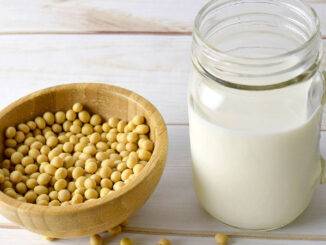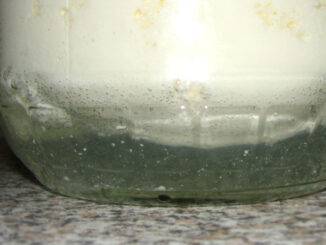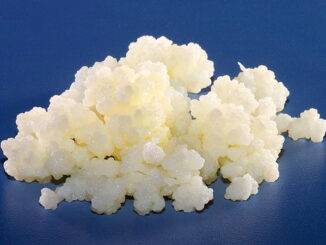
Is Kefir really gluten-free?
Yes. There is no doubt – both water Kefir and milk Kefir are gluten-free. Water and milk Kefir do not contain any gluten and are perfectly suitable for people with Celiac disease or any other type of gluten intolerance.
However, this is valid for homemade natural Kefir, made with fresh milk (or water) and inoculated with healthy milk (or water) Kefir grains.
Some commercially sold Kefir products, like Kefir smoothies, ice creams, shakes, or some sweetened Kefir derivatives may include ingredients that may contain gluten.
Additionally, readers told us that some commercially sold “Kefir starter kits” use oats as a fiber source (prebiotic) for their preparation. These “starters” may also not be entirely gluten-free.
So, don’t forget to read labels whenever you buy a commercially sold Kefir product from your convenience store. But beyond that …
Natural Kefir is gluten-free and is not only acceptable for people affected by Celiac disease but can also alleviate the symptoms of this disease and even, in the long term, eventually heal it.
As long as gluten intolerance is usually related to a specific condition, called Celiac disease, let’s first clarify …
What is gluten?
Gluten is a protein found in certain cereal grains, strictly speaking, in wheat grains.
Although it is not yet confirmed, some experts believe that today’s genetically modified wheat contains higher amounts of gluten than the cereal that has fed humanity for centuries. Due to the introduction of GMOs, this imbalance is most probably one of the main reasons why different forms of gluten intolerance are recently becoming a real threat to public health.
Reactions to gluten can have different levels – starting from relatively mild gluten hypersensitivity, passing through gluten intolerance, and ending with its most severe form – the Celiac disease.
Gluten can cause intestinal damage to affected people and cause symptoms like diarrhea, flatulation, and bloating. The extreme cases of Celiac disease can lead to serious health effects such as anemia, stunted growth, and neurological conditions.
What is Celiac disease, and what causes it?
Celiac disease is an autoimmune disorder that generally results in the immune system attacking its own body’s cells. It is considered the most severe form of gluten intolerance.
Celiac disease is a form of hypersensitivity triggered by the protein gluten found in wheat, rye, barley, and sometimes oatmeal. An emerging problem related to “modern times” is that nowadays gluten is often added to many foods and products like sauces, mayonnaise, dressings, or sausages that we normally do not associate with cereals. In people with Celiac disease, consuming these products could also trigger adverse reactions.
In people affected by Celiac disease, gluten damages the finger-like projections of the small intestine called “villi”, which extend the absorbent surface of the internal walls of the intestine.
These finger-like “extensions” of the intestine’s internal walls play an important role in the absorption of food since they increase the internal surface of the intestine at least 40 times, and thanks to the abundant presence of capillaries in them, nutrients get absorbed and transferred into the bloodstream.
However, when these villi are damaged, the inner walls of the intestinal tract become flat and sleek, their surface area gets drastically reduced, and their ability to absorb nutrients is limited.
This reduced ability to absorb nutrients (known as malabsorption) is the reason why many people with Celiac disease also suffer from malnutrition and anemia, even if sometimes they may be overweight. Anemia is also one of the main symptoms of Celiac disease.
These “villi tips” also process the milk sugar called lactose and that’s why many people with Celiac disease are also lactose intolerant until the villi grow back to normal after a gluten-free diet.
Typical symptoms of Celiac disease usually are: general health deterioration, sense of fatigue, greasy stools, canker sores, inability to concentrate, frequent mood swings, dermatitis, osteoporosis, abdominal pain, gas, bloating, indigestion, diarrhea, and the list doesn’t end here …
How can Kefir help with gluten intolerance?
There is virtually no cure for Celiac disease, and this health condition is mainly managed by avoiding all sources of gluten or, in other words, with a gluten-free diet. Fortunately, once gluten gets eliminated, the small intestine starts to slowly rebuild itself and gradually restores its normal functions.
Although the real reason behind Celiac disease is not yet precisely determined, most experts believe that this pathological intolerance to gluten is closely related to the gut’s microbiome.
As a collection of bacteria, viruses, and fungi in the gastrointestinal tract, the gut’s microbiome plays an essential role in the absorption of nutrients and minerals, synthesis of enzymes, vitamins, and amino acids for the whole body.
Any imbalance in this microbiome may result in a series of severe health conditions, one of which is supposed to be Celiac disease. Indeed, several studies support the hypothesis that the microbiome plays an essential role in the risk of getting Celiac disease, including its origins, development, and symptoms.
As a potent probiotic, Kefir is recognized for restoring the healthy balance between harmful and beneficial microorganisms in the gastrointestinal tract.
A laboratory study found that probiotics in Kefir contribute to the improvement in the condition of patients with Celiac disease by strengthening the protective mucus of the entire gastrointestinal tract.
Kefir also suppresses the inflammatory response caused by gluten, decreases intestinal permeability (the possibility of harmful bacteria and toxins to pass from the gut into the bloodstream), and thus possibly even directly supports gluten digestion.
Another study involving 78 Celiac patients who were not following strict gluten-free diets found that Bifidobacterium (a typical bacteria found in Kefir) resulted in significant improvement in their symptoms compared to the placebo group.
While it is still unclear whether probiotics (and Kefir, in particular) could completely cure patients with Celiac disease, it is beyond any doubt that the increase in the biodiversity of their intestinal microbiome will lead to improvement of their overall health.
Summary
Kefir has at least a two-way positive effect on patients with Celiac disease:
- As a gluten-free food, Kefir is not only tolerated by gluten-sensitive people and celiacs but is also a valuable source of nutrients, vitamins, and amino acids, which makes it an essential part of their everyday diet.
- The probiotic powers of Kefir can help to alleviate the symptoms of Celiac disease and restore the right balance in the gut’s microbiome, giving the gastrointestinal tract of affected people a chance to heal on its own.



